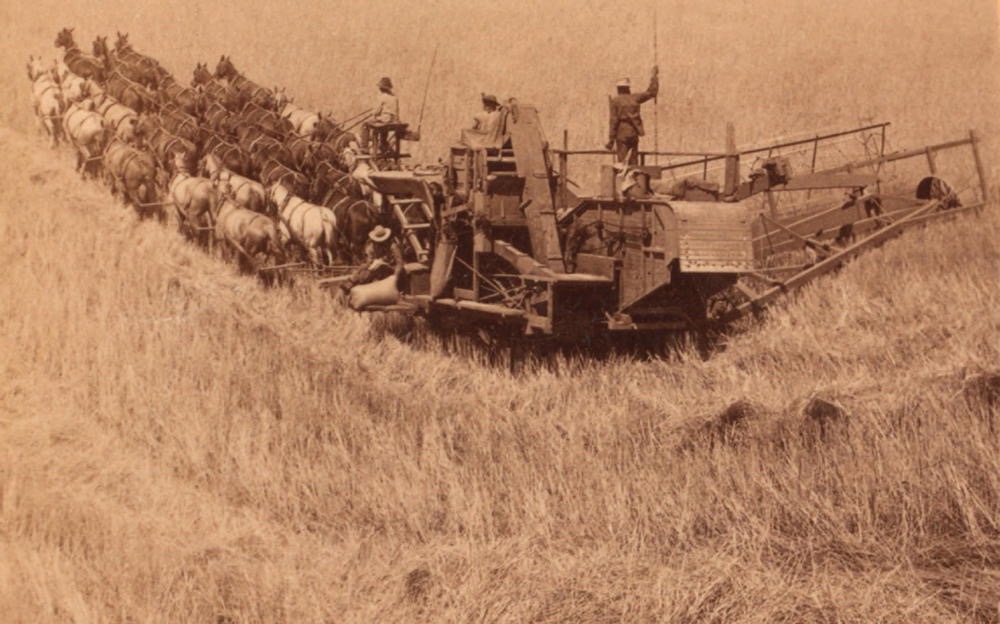Condon

Evolution of sickle and flail, 33-horse team harvester,
cutting, threshing, and sacking wheat, Walla Walla, Washington. (1902)
Stephen A. Schwarzman Building / Photography Collection,
Miriam and Ira D. Wallach Division of Art, Prints and Photographs,
New York Public Library
"I visit her every Memorial Day."
The Gods decided, as The Gods always decide such things, in mysterious ways. After my mother's grandparents met as neighbors and then as step-siblings after each lost a parent and their surviving parent married their neighbor, they married and settled down on what appears to have been the neighboring ranches south of Condon, Oregon. They came of age in dryland wheat country, so they raised dry-land wheat, an incredibly labor-intensive effort. During harvest, scores of seasonal workers arrived to frantically work for a month or so before returning to from wherever they came or moving on to the next crop. Wheat harvest would melt into apple harvest, and the crews would disappear into the Yakima, Walla Walla, or Hood River Valleys to take advantage. In the days before the railroad came and before the co-ops built grain elevators, wheat was harvested into burlap bags, each holding three bushels and weighing about 180 pounds. The bags would fill on the harvester, and a worker would quickly whip-stitch them closed before slipping them off for later gathering.
My maternal grandfather, Elza (pronounced El-Zee) Franklin Wallace, worked this sort of wheat harvest, as did my grandmother, Ruby Kenaston, since she grew up on that ranch. She had been briefly married to some guy from Pendleton for less than a year. I don't know the whole story, but I suspect a pregnancy that ended in a miscarriage, which eliminated the need for the marriage. Elza had gotten drafted into the Army during WWI and shipped off to Ft. Lewis for basic training before shipping out to Fort Dix, New Jersey, to prepare for the trip to France. The armistice came while he was waiting on a troop ship in New York Harbor. He was quickly mustered out and returned to Condon, where he met my grandmother and later produced Bonnie, my mom, after her sister, Colleen. Just after Elza returned from the service, a very pregnant young woman from New Jersey arrived to confer with Elza. He denied paternity, and she left. I know nothing more of the story.
Elza was a farmhand. He never owned farmland. He had learned about construction from his father, Nathaniel Parker Wallace, who was entrepreneurial enough to build houses west of the mountains in Troutdale, Oregon, apparently commuting by train. Elza graduated from school after third grade, yet he could calculate roof slopes in his head. He was apparently a hale fellow well met but never one to necessarily bust his butt working. For years, when my mother was small, he maintained a relationship with a local whore. It was an open secret that deeply wounded my grandmother and later appalled his daughters. He was fun-loving, apt to drive off any road anywhere just to see what he might find there. He was an avid hunter and an inveterate kidder, always chuckling after misleading one of his grandchildren about something. He never amounted to much. He proved to be a disappointment. After Ruby died of breast cancer at Christmas 1948, he married a golddigger who was after his army pension but soon divorced her and then moved out to Garibaldi on the ocean, where his mother and sister had settled. He parked his trailer in a widow's side yard and became her handyman and confidant. They became inseparable, he and Ora Lewis. They took care of each other until he died on a hunting trip at 72.
In Condon, he and Ruby owned a nice little house with a small barn in the back. My mom was schooled in all the domestic arts: canning, sewing, cooking, and conspiring with her many aunts, great-aunts, uncles, and cousins. She was a blond beauty, not keen on schooling but always working. Condon was still a small city then, and she secretaried for a lecherous lawyer and ushered at the local theater. Her mom's parents left the ranch after the kids fledged, probably as a direct result of the Great Depression, and bought a place in West Richland, then a budding asparagus and fruit orchard location. They grew their asparagus and nearly froze to death in their tarpaper shack until the War Department bought their place for the Hanford Reservation. They bought a little place in Walla Walla with the money and happily retired from farming forever. Later, my birth family would rent a house just around the corner and down the block from that Keniston place.
I wanted to avoid writing an obituary kind of story here, though I'm not at all sure I've managed to avoid one. When writing about the departed, it's difficult to avoid that omniscient voice and tone always adopted by those still living. There's a tinge of arrogance in it as if the writer survived to know better, but I feel supremely ignorant. I barely nicked sharing this world with them. I knew them after they were dismantled and retired, not when they were vital and still seeking. I never knew my mother's mom, as she died three years before I was born. I barely knew my more ancient elders, for there always seemed to be some impenetrable barrier between us, as if they had seen stuff they couldn't imagine how to describe and didn't want to dredge up, anyway. I remember actively pretending everything would be okay, even when I felt certain it wouldn't be. I remember watching the phone, an old black bakelite rotary monster, knowing that one very early morning, it would ring and bring news of another forebear's departure. My great-grandmother Keniston left this way when I was in the seventh grade. I visit her every Memorial Day.
©2024 by David A. Schmaltz - all rights reserved


